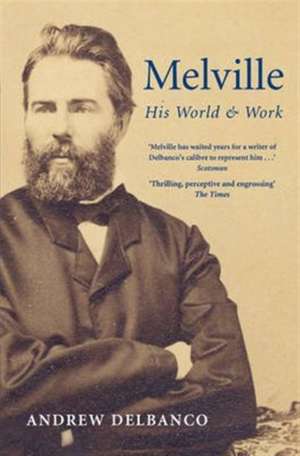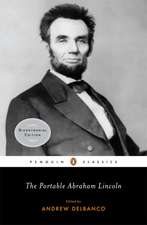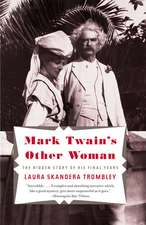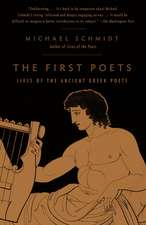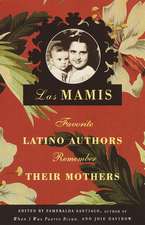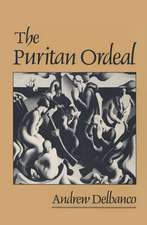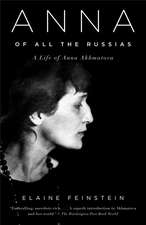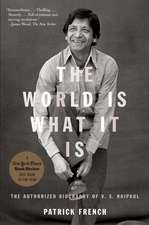Melville
Autor Andrew Delbancoen Limba Engleză Paperback – 23 mai 2013
| Toate formatele și edițiile | Preț | Express |
|---|---|---|
| Paperback (2) | 112.95 lei 6-8 săpt. | |
| Vintage Books USA – 31 aug 2006 | 129.86 lei 3-5 săpt. | |
| PICADOR – 23 mai 2013 | 112.95 lei 6-8 săpt. |
Preț: 112.95 lei
Preț vechi: 130.73 lei
-14% Nou
Puncte Express: 169
Preț estimativ în valută:
21.61€ • 22.65$ • 17.87£
21.61€ • 22.65$ • 17.87£
Carte tipărită la comandă
Livrare economică 11-25 aprilie
Preluare comenzi: 021 569.72.76
Specificații
ISBN-13: 9781447241614
ISBN-10: 1447241614
Pagini: 450
Dimensiuni: 156 x 234 x 27 mm
Greutate: 0.76 kg
Editura: PICADOR
ISBN-10: 1447241614
Pagini: 450
Dimensiuni: 156 x 234 x 27 mm
Greutate: 0.76 kg
Editura: PICADOR
Notă biografică
Andrew Delbanco is the author of The Death of Satan (1995), Required Reading: Why Our American Classics Matter Now (1997), and The Real American Dream (1999), all of which were NYTBR notable books. The Puritan Ordeal (1989) won the Lionel Trilling Award from Columbia University. He has edited Writing New England (2001), The Portable Abraham Lincoln (1992), volume two of The Sermons of Ralph Waldo Emerson (with Teresa Toulouse), and, with Alan Heimert, The Puritans in America (1985). His essays appear regularly in The New York Review of Books, The New Republic, The New York Times Book Review, Granta, Partisan Review, Raritan, and other journals.
In 2001 he was named a Fellow of the American Academy of Arts and Sciences and in 2003 named New York State Scholar of the Year by the New York Council for the Humanities. He is a trustee of the National Humanities Center and the Library of America, and has served as Vice President of PEN American Center. Since 1995 he has held the Julian Clarence Levi Professor Chair in the Humanities at Columbia University.
In 2001 he was named a Fellow of the American Academy of Arts and Sciences and in 2003 named New York State Scholar of the Year by the New York Council for the Humanities. He is a trustee of the National Humanities Center and the Library of America, and has served as Vice President of PEN American Center. Since 1995 he has held the Julian Clarence Levi Professor Chair in the Humanities at Columbia University.
Extras
CHILDHOOD AND YOUTH
1.
He was born on August 1, 1819, into good circumstances. But his parents lacked the money to stay there, and so they turned, at no small cost to their dignity, to their elders for help. On his mother’s side, the benefactor was Maria’s father, Peter Gansevoort, a towering man (six foot three in an age when six-footers were rare) famous for having commanded the defense of Fort Stanwix, an outpost guarding the trade route from the Great Lakes, during the British siege of 1777. There is a tendency today to think of the Revolutionary War as a dispute among bewigged gentlemen who sent men into battle with inaccurate guns to the martial music of fife and drum; in fact, it was a brutal war whose combatants literally tasted sweat and blood flung from the bodies of their enemies as they slashed at each other with bayonets. It was not uncommon for wounded soldiers to be stabbed through and left to bleed to death “like sieves,” or to have their brains dashed out with “barbarity to the utmost” by the musket butts of the advancing enemy. Melville was to write about this war in the novel Israel Potter, in which he described the Yankee defenders at Bunker Hill gripping their muskets by the barrel and beating back the British assault by “wielding the stock right and left, as seal-hunters on the beach, knock down with their clubs the Shetland seal.”
Melville’s Gansevoort grandfather was known for his valor in the face of superior numbers of enemy troops. At Fort Stanwix, having refused to receive a verbal message from the officer in charge of the British assault, he was presented with a written ultimatum to surrender “exhibiting in magnificent terms . . . the strength of the [British] army . . . and the hopeless situation of the garrison,” to which he replied with formal contempt:
Sir:—In answer to your letter of today’s date, I have only to say, that it is my determined resolution, with the forces under my command to defend this fort, at every hazard, to the last extremity, in behalf of the United American States, who have placed me here to defend it against all their enemies.
I have the honor to be, Sir, Your most obedient and humble servant, Peter Gansevoort, Col., Commanding Fort Stanwix
This immovable eighteenth-century gentleman lived out his years in Albany. Upon his death in 1812, seven years before his grandson Herman was born, Peter Gansevoort’s assets were passed on to his son Peter Junior, along with the obligation to look after his sister Maria and her unborn children.
On the Melville side, too, there was a modest fortune, and Herman’s father, Allan, did his best to tap it. Allan’s father, Major Thomas Melvill, was also a celebrated veteran of the Revolution, accustomed to being greeted on the streets of Boston with bows of deference.* In 1831, when the deference was turning to pity, Dr. Oliver Wendell Holmes made a little verse sketch of him called “The Last Leaf”:
My grandmamma has said— Poor old lady; she is dead Long ago— That he had a Roman nose, And his cheek was like a rose In the snow
But now his nose is thin, And it rests upon his chin Like a staff, And a crook in his back, And a melancholy crack In his laugh.
One basic fact linked the lives of Melville’s grandfathers: both had been born English and had become, by violence, American. On childhood visits to Boston, Herman heard war stories directly from Thomas Melvill, who still wore his “old three-cornered hat, / And the breeches, and all that,” and proudly showed his grandson the vial containing tea leaves brushed from his clothes after he had taken part in the Boston Tea Party dressed in Indian garb and warpaint. Though he never knew his maternal grandfather, Herman learned about “the hero of Fort Stanwix” from his mother and uncles, and doubtless had him in mind for the portrait, in Pierre, of “grand old Pierre Glendinning”—a massive man who, “during a fire in the old manorial mansion, with one dash of his foot . . . had smitten down an oaken door,” and “in the wilderness before the Revolutionary War . . . had annihilated two Indian savages by making reciprocal bludgeons of their heads.”
If Melville’s grandfathers were holdovers from the glorious past, his father lived in a fanciful future. Born in Boston, Allan Melvill wooed his bride from a venerable Dutch patroon family in Albany, then moved to the fast-growing city of New York. Having made the Grand Tour of Europe as a young man, he became an import merchant specializing in what today we would call accessories—a “deluxe Mr. Micawber,” as James Wood has aptly called him—with the groundless optimism of someone proficient at deceiving himself. He was always counting on this or that “confidential Connexion” to deliver a windfall, or assuring his creditors that some long-pending deal was about to close. “My prospects brighten,” he wrote in 1820 to his own father when Herman was not yet a year old, “& without being over sanguine, I may be allowed to indulge, under the blessing of Heaven, anticipations of eventual success.”
Allan was being over-sanguine, and everyone knew it—though for a time his bravado almost convinced the world that his failures were temporary and his successes deferred. By all accounts, he had an eye for quality. An advertisement he placed in 1824 in a New York newspaper gives an idea of his inventory: “Fancy Hdfks. and Scarfs . . . Elastic and Silk Garters, Artificial Flowers, Cravat Stiffners, &c. Also in store . . . rich satin striped and figured blk Silk Vestings, Gros de Naples Hdkfs, Belt and Watch Ribbons, 7–16 & 7–22 Silk Hose . . . Horse Skin Gloves . . . Cologne and Lavender Waters, &c.” He could switch easily into the visitor’s native language when a Frenchman entered his store, and he furnished his home with mementoes of his European travels, whose provenance he loved to detail for friends over a glass—or two—of old cognac.
But the yield from his talents was meager. Year by year, Allan turned his life into an almost sordid tale of reckless borrowing and groveling appeals for cash to carry him through to the next promised bonanza. He never became at ease in the increasingly impersonal system whereby European exports were sold in bulk to American auction houses, from which they were bought by wholesalers and distributed to the retail trade—a business in which good taste and personal charm counted for less than the ability to anticipate rising markets by buying low and falling prices by selling high. Following the trade agreements with Britain that settled the War of 1812, something like the frantic rhythm of modern commodities markets developed, and Allan Melvill was unprepared. Nearly forty years later, aspects of Allan turn up in his son’s portrait, in White-Jacket, of an effete Commodore’s secretary who looks like an “ambassador extraordinary from Versailles,” and whose prized possessions include “enamelled pencil-cases” and “fine French boots with soles no thicker than a sheet of scented notepaper.”
If Melville’s father was always off on some flighty new venture, his mother was a woman of gravity. Daughter of a respected family with roots in the quasi-feudal aristocracy of the Hudson Valley, Maria Gansevoort had grown up speaking Dutch with her parents, who provided her with the years of music and dancing lessons essential to a young lady of breeding who was expected to make herself gracious and decorative. But she was trained as well in the severe Protestantism of her ancestors, and remained wary all her life of placing too much faith in the things of this world lest they be snatched away. Especially in the months after giving birth, which she did eight times, she was given to moodiness, and though she wanted her own children to master such worldly arts as penmanship and deportment, she was at pains to prepare their souls for deprivation and death.
It was from Maria that Herman received the rudiments of a religious education. Although she chastised him well into adulthood for his spotty church attendance, and he was never what we would call “observant,” the ultimate questions posed by religion never lost their hold on his imagination. Maria, who knew the Bible in Dutch as well as English, brought biblical stories, exempla, and precedents into the lives of all her children, and for her second son characters from the Bible always remained as vividly alive as the worthies and villains of his own time. Ishmael, Bildad, Ahab, and Elijah are just a few of the names in Moby-Dick by which he invests characters with a priori allegorical significance before they begin to act in his invented world. He ends his great story “Bartleby, the Scrivener” with a quotation from the Book of Job (Bartleby sleeps “with kings and counselors”); and in his final work, Billy Budd, he gives the music of the Bible in a telling variation to Captain Vere, who quotes Acts 17:28, reminding his officers that the “element in which we move and have our being” is not God, but the sea. The pioneer scholar Nathalia Wright counts 250 biblical allusions in Moby-Dick alone. Melville knew the Bible so well, she writes, that “he could smell the burning of Gomorrah, and the pit; hear the trumpet in the Valley of Jehoshaphat and . . . taste Belshazzar’s feast.”
In the early years when he heard travelers’ tales from his father and Bible stories from his mother, Herman was too young to understand the toxic mixture of gratitude and resentment that both his parents felt because of their continued dependence on their own parents. But the anxieties of childhood stayed with him. “Ah, fathers and mothers!,” he wrote in the self-mocking style of Pierre, “. . . give heed! Thy little one may not now comprehend the meaning of those words and those signs, by which, in its innocent presence, thou thinkest to disguise the sinister thing ye would hint. Not now he knows; not very much even of the externals he consciously remarks; but if, in after-life, Fate puts the chemic key of the cipher into his hands; then how swiftly and how wonderfully, he reads all the obscurest and most obliterate inscriptions he finds in his memory. . . .” When childhood memories do turn up in Melville’s writing, they tend to be “shadowy reminiscences,” such as his allusion in Moby-Dick to the workmen he saw on visits to Boston, pushing wheelbarrows of dirt down Beacon Hill for the landfill that would become Back Bay. Tensions in his parents’ home in New York and summer visits to his Boston grandfather left impressions that became, over time, fragmentary memories tinged with sadness—as when he recalls, in Redburn, the melancholy longing provoked by the miniature glass ship displayed in his grandfather’s curio case, or when, in Pierre, he draws a portrait of a smothering mother whose compulsive demands on her son are a form of displaced rage.
Among the strains between his parents were their religious differences. Although Allan habitually spelled the word GOD with capital letters, he adopted his own father’s mild Unitarianism, which, according to more pious members of the family, including his wife, tended to diminish the majesty of God in favor of the dignity of man. Maria not only took her churchgoing more seriously but was warmly committed to the Calvinist creed to which her family had subscribed in its Dutch Reformed version. After Herman was born, she managed to persuade her pastor, the Reverend J. M. Mathews, to make an exception to the church rule against home baptism. When Mathews came to the Melvill house on Pearl Street in August 1819 to baptize the new baby, he asked both parents to acknowledge the hard truth that “children are . . . born in sin, and therefore are subject to all miseries, yea to condemnation itself,” and to promise that they would instruct their child “to the utmost of your power” in the shame of its sinfulness. Allan made sure that these affirmations were followed by a reception featuring a strong rum punch.
One thing at which Allan Melvill was adept was living beyond his means, and so his children grew accustomed to comfort and even to a touch of opulence. The family always employed several servants—housekeeper, cook, nurse, and waiter—and Allan did not cut back on expenses as he descended into debt. On the contrary, he increased them by moving from address to address, each an improvement in space and prestige on its predecessor—from No. 6 Pearl Street, just a few steps from the waterfront, a year later to larger quarters on Courtlandt Street (on the future site of the World Trade Center), to a still grander house on Bleecker Street, and finally, in 1828, to Broadway, between Bond and Great Jones streets.
Tracing the Melvills’ movements northward in Manhattan reveals a family trying to disguise the fact that its fortunes were declining. Their migration away from the noise and smell of the waterfront exemplified their plight: even as Allan moved up in the world of appearances, he was losing touch with the source of his livelihood. “In this republican country,” as Nathaniel Hawthorne wrote years later, “amid the fluctuating waves of our social life, somebody is always at the drowning-point”—and Allan Melvill was one of the drowning.
2.
How well he hid this truth from his second son is impossible to know. But we do know that on a stormy October night in 1830, his business in ruins, and owing several months of back rent on his house, Allan Melvill, accompanied by eleven-year-old Herman, fled New York City via steamboat for Albany, where his wife and the rest of the children had preceded him. Two months later, he presented the undignified spectacle of a middle-aged man and father of eight begging his own father for help: “I am destitute of resources and without a shilling,” he wrote to the old Major on December 4, and “may soon be prosecuted for my last quarters rent . . . without immediate assistance I know not what will become of me. . . .” He had become, in effect, the ward of his brother-in-law, Peter, the Gansevoort son and heir, who generously agreed to cover his “daily expences” with loans.
It was the end of Allan Melvill’s hopes and of his son’s boyhood. “I had learned to think much and bitterly before my time,” Herman was to write nearly twenty years later in the voice of the fictional narrator in Redburn. “I must not think of those delightful days, before my father became a bankrupt . . . and we removed from the city; for when I think of those days, something rises up in my throat and almost strangles me.” The memory of cowering with his beaten father in that ship as it pitched and rolled at anchor while the storm blew through New York left its trace in Moby-Dick when, speaking through the voice of Father Mapple, Melville writes of Jonah “lying in his berth” while his mind “turns and turns in giddy anguish.”
From the Hardcover edition.
1.
He was born on August 1, 1819, into good circumstances. But his parents lacked the money to stay there, and so they turned, at no small cost to their dignity, to their elders for help. On his mother’s side, the benefactor was Maria’s father, Peter Gansevoort, a towering man (six foot three in an age when six-footers were rare) famous for having commanded the defense of Fort Stanwix, an outpost guarding the trade route from the Great Lakes, during the British siege of 1777. There is a tendency today to think of the Revolutionary War as a dispute among bewigged gentlemen who sent men into battle with inaccurate guns to the martial music of fife and drum; in fact, it was a brutal war whose combatants literally tasted sweat and blood flung from the bodies of their enemies as they slashed at each other with bayonets. It was not uncommon for wounded soldiers to be stabbed through and left to bleed to death “like sieves,” or to have their brains dashed out with “barbarity to the utmost” by the musket butts of the advancing enemy. Melville was to write about this war in the novel Israel Potter, in which he described the Yankee defenders at Bunker Hill gripping their muskets by the barrel and beating back the British assault by “wielding the stock right and left, as seal-hunters on the beach, knock down with their clubs the Shetland seal.”
Melville’s Gansevoort grandfather was known for his valor in the face of superior numbers of enemy troops. At Fort Stanwix, having refused to receive a verbal message from the officer in charge of the British assault, he was presented with a written ultimatum to surrender “exhibiting in magnificent terms . . . the strength of the [British] army . . . and the hopeless situation of the garrison,” to which he replied with formal contempt:
Sir:—In answer to your letter of today’s date, I have only to say, that it is my determined resolution, with the forces under my command to defend this fort, at every hazard, to the last extremity, in behalf of the United American States, who have placed me here to defend it against all their enemies.
I have the honor to be, Sir, Your most obedient and humble servant, Peter Gansevoort, Col., Commanding Fort Stanwix
This immovable eighteenth-century gentleman lived out his years in Albany. Upon his death in 1812, seven years before his grandson Herman was born, Peter Gansevoort’s assets were passed on to his son Peter Junior, along with the obligation to look after his sister Maria and her unborn children.
On the Melville side, too, there was a modest fortune, and Herman’s father, Allan, did his best to tap it. Allan’s father, Major Thomas Melvill, was also a celebrated veteran of the Revolution, accustomed to being greeted on the streets of Boston with bows of deference.* In 1831, when the deference was turning to pity, Dr. Oliver Wendell Holmes made a little verse sketch of him called “The Last Leaf”:
My grandmamma has said— Poor old lady; she is dead Long ago— That he had a Roman nose, And his cheek was like a rose In the snow
But now his nose is thin, And it rests upon his chin Like a staff, And a crook in his back, And a melancholy crack In his laugh.
One basic fact linked the lives of Melville’s grandfathers: both had been born English and had become, by violence, American. On childhood visits to Boston, Herman heard war stories directly from Thomas Melvill, who still wore his “old three-cornered hat, / And the breeches, and all that,” and proudly showed his grandson the vial containing tea leaves brushed from his clothes after he had taken part in the Boston Tea Party dressed in Indian garb and warpaint. Though he never knew his maternal grandfather, Herman learned about “the hero of Fort Stanwix” from his mother and uncles, and doubtless had him in mind for the portrait, in Pierre, of “grand old Pierre Glendinning”—a massive man who, “during a fire in the old manorial mansion, with one dash of his foot . . . had smitten down an oaken door,” and “in the wilderness before the Revolutionary War . . . had annihilated two Indian savages by making reciprocal bludgeons of their heads.”
If Melville’s grandfathers were holdovers from the glorious past, his father lived in a fanciful future. Born in Boston, Allan Melvill wooed his bride from a venerable Dutch patroon family in Albany, then moved to the fast-growing city of New York. Having made the Grand Tour of Europe as a young man, he became an import merchant specializing in what today we would call accessories—a “deluxe Mr. Micawber,” as James Wood has aptly called him—with the groundless optimism of someone proficient at deceiving himself. He was always counting on this or that “confidential Connexion” to deliver a windfall, or assuring his creditors that some long-pending deal was about to close. “My prospects brighten,” he wrote in 1820 to his own father when Herman was not yet a year old, “& without being over sanguine, I may be allowed to indulge, under the blessing of Heaven, anticipations of eventual success.”
Allan was being over-sanguine, and everyone knew it—though for a time his bravado almost convinced the world that his failures were temporary and his successes deferred. By all accounts, he had an eye for quality. An advertisement he placed in 1824 in a New York newspaper gives an idea of his inventory: “Fancy Hdfks. and Scarfs . . . Elastic and Silk Garters, Artificial Flowers, Cravat Stiffners, &c. Also in store . . . rich satin striped and figured blk Silk Vestings, Gros de Naples Hdkfs, Belt and Watch Ribbons, 7–16 & 7–22 Silk Hose . . . Horse Skin Gloves . . . Cologne and Lavender Waters, &c.” He could switch easily into the visitor’s native language when a Frenchman entered his store, and he furnished his home with mementoes of his European travels, whose provenance he loved to detail for friends over a glass—or two—of old cognac.
But the yield from his talents was meager. Year by year, Allan turned his life into an almost sordid tale of reckless borrowing and groveling appeals for cash to carry him through to the next promised bonanza. He never became at ease in the increasingly impersonal system whereby European exports were sold in bulk to American auction houses, from which they were bought by wholesalers and distributed to the retail trade—a business in which good taste and personal charm counted for less than the ability to anticipate rising markets by buying low and falling prices by selling high. Following the trade agreements with Britain that settled the War of 1812, something like the frantic rhythm of modern commodities markets developed, and Allan Melvill was unprepared. Nearly forty years later, aspects of Allan turn up in his son’s portrait, in White-Jacket, of an effete Commodore’s secretary who looks like an “ambassador extraordinary from Versailles,” and whose prized possessions include “enamelled pencil-cases” and “fine French boots with soles no thicker than a sheet of scented notepaper.”
If Melville’s father was always off on some flighty new venture, his mother was a woman of gravity. Daughter of a respected family with roots in the quasi-feudal aristocracy of the Hudson Valley, Maria Gansevoort had grown up speaking Dutch with her parents, who provided her with the years of music and dancing lessons essential to a young lady of breeding who was expected to make herself gracious and decorative. But she was trained as well in the severe Protestantism of her ancestors, and remained wary all her life of placing too much faith in the things of this world lest they be snatched away. Especially in the months after giving birth, which she did eight times, she was given to moodiness, and though she wanted her own children to master such worldly arts as penmanship and deportment, she was at pains to prepare their souls for deprivation and death.
It was from Maria that Herman received the rudiments of a religious education. Although she chastised him well into adulthood for his spotty church attendance, and he was never what we would call “observant,” the ultimate questions posed by religion never lost their hold on his imagination. Maria, who knew the Bible in Dutch as well as English, brought biblical stories, exempla, and precedents into the lives of all her children, and for her second son characters from the Bible always remained as vividly alive as the worthies and villains of his own time. Ishmael, Bildad, Ahab, and Elijah are just a few of the names in Moby-Dick by which he invests characters with a priori allegorical significance before they begin to act in his invented world. He ends his great story “Bartleby, the Scrivener” with a quotation from the Book of Job (Bartleby sleeps “with kings and counselors”); and in his final work, Billy Budd, he gives the music of the Bible in a telling variation to Captain Vere, who quotes Acts 17:28, reminding his officers that the “element in which we move and have our being” is not God, but the sea. The pioneer scholar Nathalia Wright counts 250 biblical allusions in Moby-Dick alone. Melville knew the Bible so well, she writes, that “he could smell the burning of Gomorrah, and the pit; hear the trumpet in the Valley of Jehoshaphat and . . . taste Belshazzar’s feast.”
In the early years when he heard travelers’ tales from his father and Bible stories from his mother, Herman was too young to understand the toxic mixture of gratitude and resentment that both his parents felt because of their continued dependence on their own parents. But the anxieties of childhood stayed with him. “Ah, fathers and mothers!,” he wrote in the self-mocking style of Pierre, “. . . give heed! Thy little one may not now comprehend the meaning of those words and those signs, by which, in its innocent presence, thou thinkest to disguise the sinister thing ye would hint. Not now he knows; not very much even of the externals he consciously remarks; but if, in after-life, Fate puts the chemic key of the cipher into his hands; then how swiftly and how wonderfully, he reads all the obscurest and most obliterate inscriptions he finds in his memory. . . .” When childhood memories do turn up in Melville’s writing, they tend to be “shadowy reminiscences,” such as his allusion in Moby-Dick to the workmen he saw on visits to Boston, pushing wheelbarrows of dirt down Beacon Hill for the landfill that would become Back Bay. Tensions in his parents’ home in New York and summer visits to his Boston grandfather left impressions that became, over time, fragmentary memories tinged with sadness—as when he recalls, in Redburn, the melancholy longing provoked by the miniature glass ship displayed in his grandfather’s curio case, or when, in Pierre, he draws a portrait of a smothering mother whose compulsive demands on her son are a form of displaced rage.
Among the strains between his parents were their religious differences. Although Allan habitually spelled the word GOD with capital letters, he adopted his own father’s mild Unitarianism, which, according to more pious members of the family, including his wife, tended to diminish the majesty of God in favor of the dignity of man. Maria not only took her churchgoing more seriously but was warmly committed to the Calvinist creed to which her family had subscribed in its Dutch Reformed version. After Herman was born, she managed to persuade her pastor, the Reverend J. M. Mathews, to make an exception to the church rule against home baptism. When Mathews came to the Melvill house on Pearl Street in August 1819 to baptize the new baby, he asked both parents to acknowledge the hard truth that “children are . . . born in sin, and therefore are subject to all miseries, yea to condemnation itself,” and to promise that they would instruct their child “to the utmost of your power” in the shame of its sinfulness. Allan made sure that these affirmations were followed by a reception featuring a strong rum punch.
One thing at which Allan Melvill was adept was living beyond his means, and so his children grew accustomed to comfort and even to a touch of opulence. The family always employed several servants—housekeeper, cook, nurse, and waiter—and Allan did not cut back on expenses as he descended into debt. On the contrary, he increased them by moving from address to address, each an improvement in space and prestige on its predecessor—from No. 6 Pearl Street, just a few steps from the waterfront, a year later to larger quarters on Courtlandt Street (on the future site of the World Trade Center), to a still grander house on Bleecker Street, and finally, in 1828, to Broadway, between Bond and Great Jones streets.
Tracing the Melvills’ movements northward in Manhattan reveals a family trying to disguise the fact that its fortunes were declining. Their migration away from the noise and smell of the waterfront exemplified their plight: even as Allan moved up in the world of appearances, he was losing touch with the source of his livelihood. “In this republican country,” as Nathaniel Hawthorne wrote years later, “amid the fluctuating waves of our social life, somebody is always at the drowning-point”—and Allan Melvill was one of the drowning.
2.
How well he hid this truth from his second son is impossible to know. But we do know that on a stormy October night in 1830, his business in ruins, and owing several months of back rent on his house, Allan Melvill, accompanied by eleven-year-old Herman, fled New York City via steamboat for Albany, where his wife and the rest of the children had preceded him. Two months later, he presented the undignified spectacle of a middle-aged man and father of eight begging his own father for help: “I am destitute of resources and without a shilling,” he wrote to the old Major on December 4, and “may soon be prosecuted for my last quarters rent . . . without immediate assistance I know not what will become of me. . . .” He had become, in effect, the ward of his brother-in-law, Peter, the Gansevoort son and heir, who generously agreed to cover his “daily expences” with loans.
It was the end of Allan Melvill’s hopes and of his son’s boyhood. “I had learned to think much and bitterly before my time,” Herman was to write nearly twenty years later in the voice of the fictional narrator in Redburn. “I must not think of those delightful days, before my father became a bankrupt . . . and we removed from the city; for when I think of those days, something rises up in my throat and almost strangles me.” The memory of cowering with his beaten father in that ship as it pitched and rolled at anchor while the storm blew through New York left its trace in Moby-Dick when, speaking through the voice of Father Mapple, Melville writes of Jonah “lying in his berth” while his mind “turns and turns in giddy anguish.”
From the Hardcover edition.
Recenzii
“Masterful. . . Delbanco is a fine historian as well as a fine critic”–The New Republic
“An eclectic, humane, historically grounded tribute to Melville’s best achievements and a moving account of the troubles that closed in on him. . . . Among recent lives of Melville, this one has no peer for grace of style, vividness of historical evocation, and sympathy for a subject whose flaws and prejudices are nevertheless kept in view.”
–The New York Review of Books
"In Andrew Delbanco, Melville has found the perfect combination of biographer and critic [skilled] at re-creating the circumstances — the historical moment, the physical setting, the emotional state, the spiritual frenzy, that attended Melville's art.” –The Wall Street Journal
"Andrew Delbanco places the enigmatic Herman Melville in a light that is remarkably sustained and often brilliant. His acute sense of the man, his wide-angled literary insight, and the range and strength of his grasp of Melville's world enable Delbanco to deliver full-scale the strangest of our literary giants. He also has placed himself in the company of Edmund Wilson, Alfred Kazin and Richard Chase as a trustee of our literature who writes as well as he reads." -Ted Solotaroff“
Delbanco’s Melville is a reward, a brilliant and nourishing narrative that reaches beyond literary biography to an exuberant cultural history. His voice is strong–at times personal in his fresh reading of Melville’s life and work.” –Maureen Howard
“An eclectic, humane, historically grounded tribute to Melville’s best achievements and a moving account of the troubles that closed in on him. . . . Among recent lives of Melville, this one has no peer for grace of style, vividness of historical evocation, and sympathy for a subject whose flaws and prejudices are nevertheless kept in view.”
–The New York Review of Books
"In Andrew Delbanco, Melville has found the perfect combination of biographer and critic [skilled] at re-creating the circumstances — the historical moment, the physical setting, the emotional state, the spiritual frenzy, that attended Melville's art.” –The Wall Street Journal
"Andrew Delbanco places the enigmatic Herman Melville in a light that is remarkably sustained and often brilliant. His acute sense of the man, his wide-angled literary insight, and the range and strength of his grasp of Melville's world enable Delbanco to deliver full-scale the strangest of our literary giants. He also has placed himself in the company of Edmund Wilson, Alfred Kazin and Richard Chase as a trustee of our literature who writes as well as he reads." -Ted Solotaroff“
Delbanco’s Melville is a reward, a brilliant and nourishing narrative that reaches beyond literary biography to an exuberant cultural history. His voice is strong–at times personal in his fresh reading of Melville’s life and work.” –Maureen Howard
